EBR charges a service fee to manufacturers to produce ebike reviews and videos, this began in 2018. It’s the same flat fee for each bike, and it helps us to keep the site going while limiting ad clutter. We appreciate the opportunity to serve you with our opinions and data but respect your right to know that we receive compensation :)
Propella launched their first product on Indiegogo in early 2016 and has since produced a refined 2.0 version which is what I’m reviewing here. This product comes in either a single speed or 7-speed setup, and I was loaned the single-speed with an upgraded carbon fiber aero wheel (which retails for an additional $249). I will be discussing a few differences between the 2.0 and upcoming 2.2, which will arrive in Summer 2018 and is currently taking pre-orders. The main differences are a more upright geometry, rack bosses at the rear dropouts on the single speed frame (the current 7-speed frame has these), wider 700x32c tires, a spring loaded battery lock, and some controller adjustments. Propella has two primary goals: Get people riding bikes, and make them look good while they’re doing it. Their newest iterations, the Propella 2.0 and Propella 2.2 seem to have fulfilled those ambitions. It should be noted up front though that the 2.0 is no longer available, and all orders from Propella from the time of this writing moving forward will be for the 2.2. This bike has a sweet black and blue color scheme that is well matched from top to bottom. The deep dish rims and locking points on the grips are a metallic anodized blue that is just beautiful. There are also blue accents on the grips, saddle, and battery, and the frame and fork are painted with smooth satin black. The base model single speed is priced at $1,199 and, which seems like a sweet deal because the frame is purpose built with internally routed cables, and many of the accessories are name-brand vs. generic. It would fit perfectly into urban environments, and is easy to lift at just 34 lbs (with the battery left on!) Hills could be a struggle if you’re starting from rest, but once the bike is up to speed, the 250-watt motor basically doubles your human pedal power. For those who expect to climb hills frequently, consider the 7-speed version, which uses a Shimano Altus derailleur. All models offer a top pedal-assist speed of 16 mph, which is lower than most competing products that top out at ~20 mph. The single speed gearing is designed to match comfortable pedaling to the speed where the motor begins to fade out, and this improves overall efficiency. The gearing consists of a 44 tooth chainring with a 16 tooth rear sprocket. It currently only comes in one frame size, 19 inches, and a sturdy high-step diamond style. High-step frames are known for being stiff, sturdy, lightweight, and easier to lift and mount on car or bus racks. The folks from Propella told me that in the coming months, there may be more frame sizes and color schemes available, but with such a low price point, I can see why they stuck with very limited options to begin. I was able to put about 15 miles or so on the Propella 2.0 and I noticed some interesting points about this bike that really stand out. So, let’s dive into this review and take a look at the specs!
Driving the Propella 2.0 to a top pedal-assist speed of roughly 16 mph is a Bafang 250-watt internally geared hub motor. This is a motor I’ve tested a handful of times now and I really like how quiet and efficient it is. Also, given it’s small size, it all but disappears behind the sprocket or cassette, and disc brake which helps make the Propella 2.0 stealthy. The motor freewheels, and will not produce excess drag as some gearless designs might, so you can still pedal easily when the bike is turned off. While this motor only puts out 250 nominal watts (with 350 peak watts) it’s still pretty zippy, offering 35 to 40 Newton meters of peak torque. I was talking with Court about this and he made a point that 250 watts is the average power output of a professional cycling athlete. So when thinking about it like that, 250 watts seems like a fair amount of power. It’s also pretty quiet, and while I could hear a slight whirring sound when it was under strain, overall the motor noise was masked pretty well by the road noise and ambient noise. This bike has a 12-magnet cadence sensor, which measures the rotation of the cranks, compare to a torque sensor, which measure the torque, or pressure, applied to the cranks. Cadence sensors normally have a slight delay from the time I start pedaling to the time the motor actually starts putting out power, and then another delay from the time I stop pedaling to the time the motor shuts off. The same goes for the cadence sensor here, but the 12 magnet design is faster than 5 or 6 magnet I see elsehwere. Cadence sensors also have a sort of start-stop feeling to them, where the motor is either on at 100 percent or off. This can make for a jerky ride experience, but the Propella 2.0 is equipped with a pure sine wave controller, which gives a much smoother roll on of power from the motor (even if the signal going to the motor from the cadence sensor is on/off). The controller itself puts out 14 Amps and is built into the mounting bracket, which mounts to the downtube. With this slightly nicer controller design, the Propella 2.0 almost feels like riding an electric bike with a torque sensor, which is very cool. The pure sine wave controller also smoothly rolls the power off right around 15 mph, providing increasingly less help from 15 mph to 16 mph, at which point the motor shuts off completely. Again, this just makes for an all around smoother ride experience compared to most cadence sensors, and helps to extend your range. This configuration feels very well thought out from Propella’s end. When pedaling at 16 mph, I felt my cadence was right in the sweet spot on the single speed model, and during my 15 miles or so of testing, I found that I was really only using the pedal assist to help get me up to 16 mph, and then occasionally using it to help maintain 16 mph. I think this is especially important given the below-average capacity of the battery, which is a 36v, 6.8ah battery. Propella estimates the range of a single charge to be somewhere between 15 and 35 miles, which I think is probably about right given the points above and my ride test. The last thing I want to mention about the motor and cadence sensor setup is that I really only noticed the lag when I was at a dead stop and wanted to accelerate quickly, specifically when I was at a crosswalk and trying to cross the street. Because this is a single speed, and because there is a slight delay with the cadence sensor, I found I needed to get out of the saddle and really give it some oomph to get it going. Of course, this will probably be true of all single speeds with a cadence sensor, but I wanted to point it out anyway because there is no throttle. Stopping is handled very well, with motor inhibitors built into both brake levers… the 2.0 uses Zoom but the 2.2 will have nicer Shimano hardware.
The Propella 2.0’s battery is located on the downtube and, as I mentioned briefly above, is a little below average in terms of capacity, with only 244.8 watt hours on tap compared to an average of 350 wh. The battery itself, however, is a bullet-style that looks like a water bottle and only weighs ~3.2 pounds. Some bullet style batteries like this tend to have some issues with the prongs on the connector getting bent and/or gunked up and stuck in over time. Normally, the connectors with these types of batteries only have two prongs, but Propella bumped it up with a total of four, so the connection is nice and secure and there shouldn’t be as many issues with dust and water jamming them. This is a locking battery that can be taken off the frame with the turn of a key, and Propella mentioned to me that the 2.2 will have an upgraded battery housing with a spring-loaded latch. This means you won’t need the key to reattach the battery, but instead can just push it back on. The battery housing on the 2.2 will also be a bit beefier, though I’m not entirely sure exactly what will be changed to make this happen. The battery also has a nice loop on the end of it to make it safe easy to carry around, though unfortunately there’s no USB port, so it can’t be used as a portable battery bank to charge up accessories. On the outside of the battery is a button and four LEDs, a nice way to quickly check how much juice is left in the tank before taking a ride. It’s best to store Lithium-ion batteries in a cool, dry location, away from extreme heat and cold. The included 2 amp charger weighs just over a pound and is super compact, so you could toss it into a backpack and bring it to work or school… They even sell additional batteries for $300 and additional chargers for $45 so you could increase range or leave one charger at your destination vs. carrying it around all the time. To me, at a glance, the battery look like a water bottle. This, along with the fact the motor is pretty well hidden and quiet (because of the pure sinewave controller) just adds to the stealthiness of the Propella bike. And because of it’s location on the downtube, the bike feels well balanced. The Propella 2.0 has an overall curb weight of 34.2 pounds and because of the aluminum alloy diamond frame, I was able to pick it up by the middle of the top tube and throw it over my shoulder without it tipping forward or back. This is a pretty sweet point for anyone who wants to use this bike in an environment with lots of stairs.
I really appreciate the color scheme on this bike, especially the blue accents everywhere. The super deep dish rims are beautiful and because of the shorter spoke length add a bit more strength, but this also means there will be less give, making for an even stiffer ride on a bike with no front suspension and highly pressurized tires with a low air volume. The tires on the 2.2 will be Kenda, as opposed to the Vittoria tires on the model I tested. However, the wheels will still be 28 inches in diameter. The narrow width and high pressure of these tires – 50 to 75 PSI – makes for a nimble bike indeed, but as mentioned, the overall low volume means the tires won’t provide much shock absorption. Another aspect to consider with low air volume, high pressure tires is that they tend to lose air more quickly and should be checked regularly. If this were my bike, I would probably check the PSI before every ride so I didn’t get a pinch flat. I hate having to pause my ride to change a flat tire. If you do need replacement tubes, you might not be able to get them from your local bike shop because they are fancier long 60 mm stem Presta tubes like this, because the stems have to reach all the way out of the deep dish rim. As mentioned earlier, Propella also offers a carbon fiber aero-rim for the front wheel that runs for $249. I was able to test this aero-rim and absolutely loved it. Not only is it aesthetically pleasing, it’s also lightweight – the front wheel with the aero rim weighs just 4.1 pounds. I’m not sure how much the normal rims weigh as I didn’t have one of those to measure, but I suspect the aero rim is fair amount lighter, Propella said it was almost one pound lighter… As their name implies, aero rims are indeed more aerodynamic and slice through the air when riding forward. They also make a really sweet whirring sound like a mini-wind turbine when they’re spinning fast. There is, unfortunately, one major drawback to aero rims: They catch side wind. Lateral wind gusts can affect steering, and wheel I didn’t really experience this at the lower speeds on the Propella 2.0, I’ve definitely felt this when racing at higher speeds. I used to do triathlons and almost always used an aero wheel in the front. Some riders would also have a full aero wheel in the back, and on more than one occasion I’ve seen these riders get literally knocked over by wind. Granted, this only happens in extremely windy conditions, but the point I want to make is to please be careful when riding with an aero rim. One final takeaway here is that the stiffer wheelset, high pressure tires, and rigid alloy frame and fork (vs. a steel or carbon fork) make this an aggressive and less comfortable bike. You could improve the comfort a lot with a simple 27.2 mm seat post suspension like this and a shockstop stem to protect your back, neck, shoulders, and wrists on bumpy terrain or longer rides.
The control center on the Propella 2.0 is basic but efficient. It’s a fixed, backlit LCD display with a four-bar battery indicator, pedal assist level (0-5), clock, speedometer and the ability to toggle between a tripometer and odometer with the quick press of the M power button. There’s also a walk mode that can be accessed by holding the down arrow for a second or so. The walk mode felt a little fast for me, around 4 mph, but when going uphill the speed slowed to a reasonable 1 or 2 mph. As far as I know, there’s no way to adjust the walk speed in the settings menu. Since this display is fixed, leaving the Propella 2.0 at a public bike rack might result in the display getting scratched up by another bike, or getting worn down by the sun and rain over time. Although the display itself isn’t particularly unique, I think this bike would likely attract a lot of attention, especially with the aero wheel. And, much like the battery pack not having a USB charging port, the display lacks this also, so you cannot charge your phone, lights, or other portable electronics while riding. It’s not such a big deal here however, given the lower capacity battery pack. I really appreciate that the display panel is separate from the control pad, which is positioned super close to the left grip. This allows for easier interactions while riding, without having to take your hand off or even look down to change levels of assist.
When it comes to stopping power, the Propella 2.0 has Zoom mechanical disc brakes with 160 mm rotors. The brakes on the version I tested were a little squeaky, but still brought the bike to a stop fairly quickly. The Propella 2.2 will have upgraded Shimano rotors and possibly calipers, but I’m not sure exactly what model they will be. The brake levers are four-finger Zoom brand and aren’t adjustable the way that hydraulic brake levers often are. They require more hand strength and a medium reach compared to hydraulic, but are probably fine for people who can fit on this high step frame and are seeking a more active bike as they are probably pretty fit to begin with. And that’s an interesting point, is the expense and weight of an electric assist bike worth it on a 16 mph single speed bike? For people who ride longer routes on a daily basis, have to cut through wind or manage hilly terrain… I’d say yes. It’s actually much more efficient to charge an ebike with $0.03 worth of electricity and have it help you than it is to eat more food, digest it, and waste heat energy by pedaling. From a health perspective, smooth consistent mid-range heart rate is healthier than extremes. This bike just makes riding more fun, and perhaps that means you will use it more frequently or even be able to replace your car or UBER trips. One final note about the brakes themselves, they do have motor inhibitors, which cut power to the motor whenever they’re depressed. This is a feature I love to celebrate whenever I see it, as I feel it’s quite important to have on a cadence sensing electric bikes, even with lower power. Having motor inhibitors ensures the shortest possible stopping distance by making sure the rider isn’t fighting against the motor itself while braking. On electric bikes with torque sensors, which activate and deactivate quite quickly, this may not be as important, but I think it’s a necessity for electric bikes like this one that have cadence sensors, which can have a delay.
A couple of other quick callouts I want to make include the stainless steel horizontal dropout on the right side of the frame, which handles the torque being put out through the motor axle. It’s a beautiful and elegant solution compared to a full sized external torque arm, and is probably more than sturdy enough for a motor of this size. I love the black hub motor casing, black bladed fork, and black spokes, the reflective tires for safer night riding, and the bottle cage bosses on the bottom of the downtube. I’d probably upgrade the pedals from lightweight cage style (which get bent easily and don’t offer as much surface area) to some matching blue Wellgos. I appreciate that Propella took to the time to color match pretty much everything on this bike and especially how much consideration went into the gearing ratio. These guys are into bicycles first, their team wasn’t sure about ebikes when this project began and their aim was to make a product that would appeal to their type of rider… and make sense as an electric product. There’s a lot of name brand parts on this bike, like Zoom handlebars, Bafang motor, Lasco cranks, Zoom brakes etc, and I think that for $1,200 this is a good value buy for those who want to ride in style on a simple, easy to use electric bike. Again, since this is a single speed, tackling hills might prove a bit difficult, but for those who live in a hillier area, there’s also a 7-speed version for $1,399. I want to thank Propella for partnering with me on this review and welcome you to post comments below or in the Propella Forums where other owners might be able to chime in.
Pros:
- With a curb weight of just 34.2 pounds, this is a light electric bike, and because of diamond frame and position of the battery and motor, I was able to easily pick it up and carry it around by the top tube
- Satin black and metallic blue color scheme looks great and almost every component has a touch of blue added in, the optional aero front wheel looks especially nice
- Single speed adds to the overall simplicity of the bike and also means there will be less maintenance and chance of derailment compared to electric bikes that have derailleurs but they do also sell a 7-speed version
- Bafang geared 250-watt hub motor is efficient and sips power, the pure sine wave controller provides a smooth rolling on of power which makes it feel more like a torque sensor, even though it uses a high resolution 12-magnet cadence sensor
- The custom bullet battery design has four prongs on the connector compared to other batteries of this type, which only have two, this should decrease the chance of the prongs getting bent
- Super deep dish rims have nice metallic blue color and add strength to the wheel because of the shorter length of the spokes, they provide a bit of aerodynamic properties as well
- Motor inhibitors cut power to the motor whenever the brakes are depressed, ensuring the rider isn’t fighting against the motor when braking, this provides the shortest possible stopping distance
- Gearing of 44T chainring and 16T rear sprocket feels perfect for pedaling at 16 mph, the exact speed where pedal assist fades out, riding at lower speeds extends range due to limited air resistance
- Even though the bike is relatively affordable at $1,200, Propella still went with a lot of name brand parts, like Shimano disc brakes, Zoom handlebars and brake levers, Bafang motor, etc. and offers a full year comprehensive warranty
- The kickstand is located at the rear of the bike and out of the way of the pedals, so there’s not pedal lock when the kickstand is deployed
- Internally routed cables keep the Propella 2.0 looking clean, and because the motor is mostly concealed by the rear disc brake and sprocket, and because the battery looks kind of like a water bottle, this feels like a stealthy electric bike that flies under the radar
- Tires have reflective sidewalls for increased visibility in low light conditions, this is important for an all-black bike without lights, consider adding some removable usb-rechargeable lights like this
- Steel insert in the rear dropout provides added strength and reduces the risk of the aluminum frame getting mashed up as the motor axle rocks from on to off over time
- The bike frame has fender bosses, front and rear rack bosses and bottle cage bosses below the downtube, the 2.0 single speed version did not have rear dropout eyelets but all 2.2 models will have them
- Locking grips help keep them securely in place, which I think is especially important for a singel speed bike like this, where it’s sometime necessary to get out of the saddle and really ratchet down on the handlebars to get going
Cons:
- The stock pedals are cage style platforms that don’t offer a lot of space and can get bent up (as seen in the video and images), consider some larger lightweight Magnesium Wellgos that come in a range of fun colors
- Currently only comes in one frame size, 19”, and one color scheme, black with blue accents, but the accents flow throughout the frame (saddle, bottle battery, locking grips, deep dish rims)
- Four-bar battery indicator isn’t very precise, with only 25 percent increments to denote battery level, it also sagged as I used the motor and voltage dropped temporarily vs. staying consistent
- Mechanical brake levers aren’t adjustable, which could make gripping the levers difficult for those with extra small or extra large hands, or for those who wear thick gloves while riding, over time the mechanical wire can stretch and get sticky in some situations
- No front headlight, or rear headlight, this coupled with the black color makes for a bike that might be difficult to see at night or in low light conditions, consider removable aftermarket lights like these
- No front suspension or seat post suspension coupled with the highly pressurized tires with low air volume and deep dish rims make for a stiff ride, you could add a cheap 27.2 mm suspension post like this but keep in mind that it will raise the minimum saddle height by a few inches, consider a suspension stem like this to reduce wrist, arm, shoulder, and neck fatigue (they also sell a more upright ShockStop suspension stem here)
- Front aero wheel looks great and is lightweight, but can catch wind and negatively affect steering at times, it could also attract unwanted attention and get scratched up easier at bike racks
- Tires don’t have puncture protection, and because they are high pressure, low air volume tires they tend to bleed air more quickly than low pressure, high air volume tires, flats might be an issue here if the pressure isn’t closely monitored and the replacement tubes require long stem 60 mm presta valves which not every shop carries, get them before you end up with a flat tire
- Battery capacity is lower than average and the battery itself doesn’t have a USB port, so it can’t be used as a portable power bank to charge accessories on the go, the display panel also lacks a USB charging port… but without a big battery, maybe that’s not such a big deal
- Cadence sensor has a delay from the time pedaling begins to the time the motor actually starts putting out power, this makes starting from a dead stop more difficult on this bike since it’s a single speed
- Chainring doesn’t have a chain guard or chain guide, and while derailment isn’t likely, this means pants and dresses are more likely to get dirty while riding, and loosely fitting pants might get caught in the chainring teeth
- While the base model is a good value buy at $1,200, the front aero wheel is an additional $250 and the 7-speed version is another $200, this quickly adds up and turns this into a more expensive entry-level bike
Resources:
- Official Site: https://www.propella.bike/
- More Pictures: https://photos.app.goo.gl/KT2UVCcCHyzvKV2s1


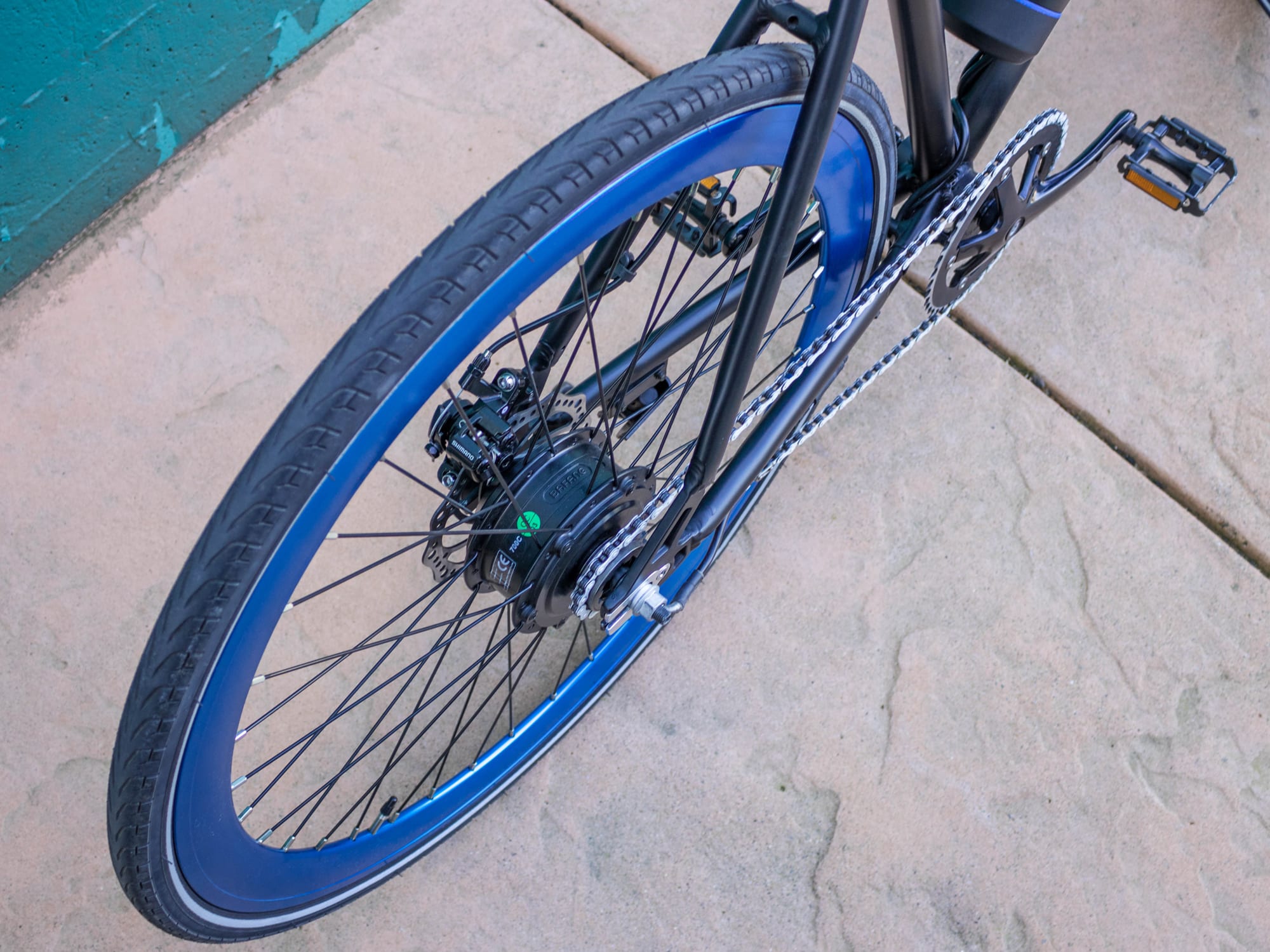
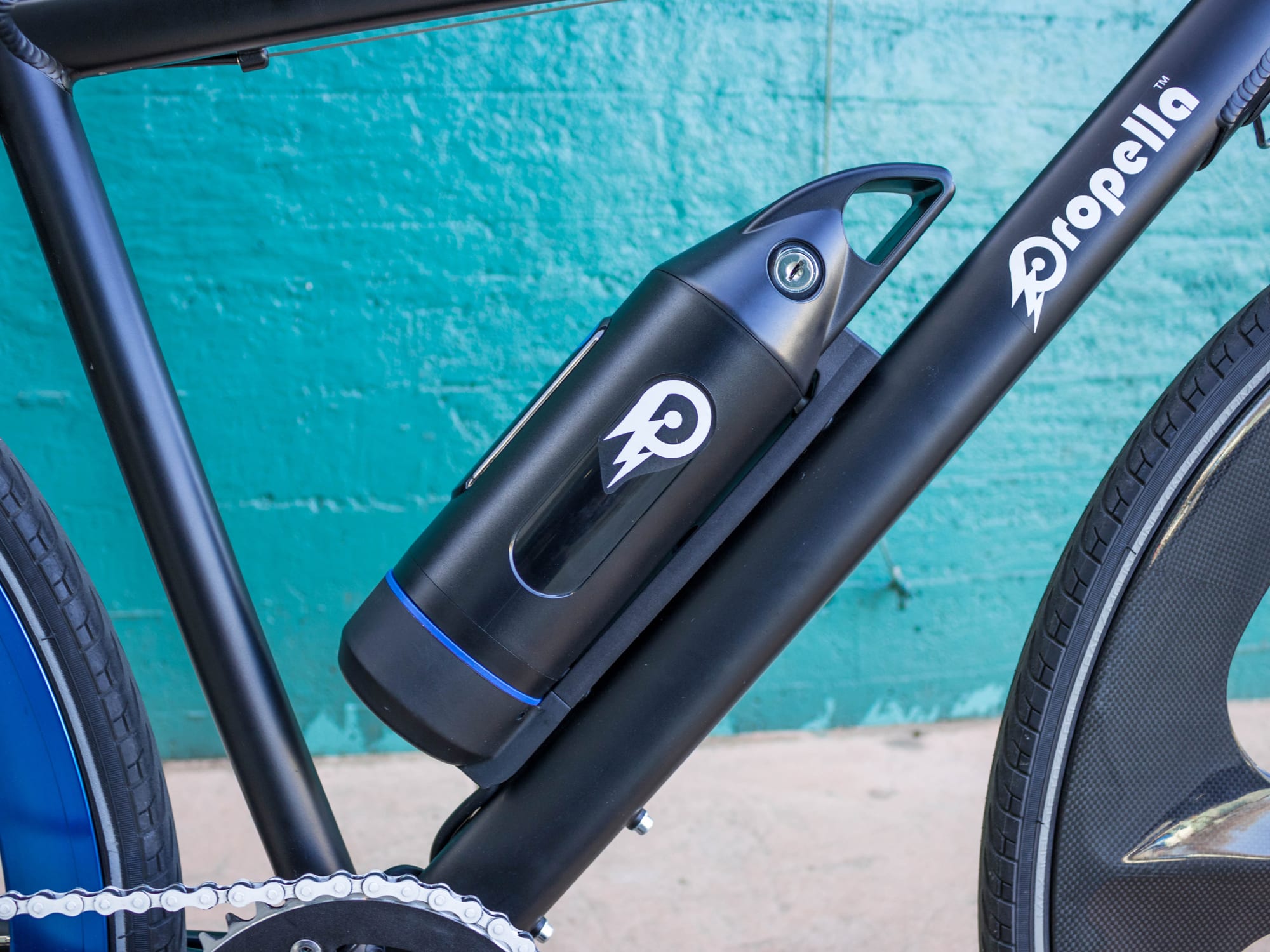
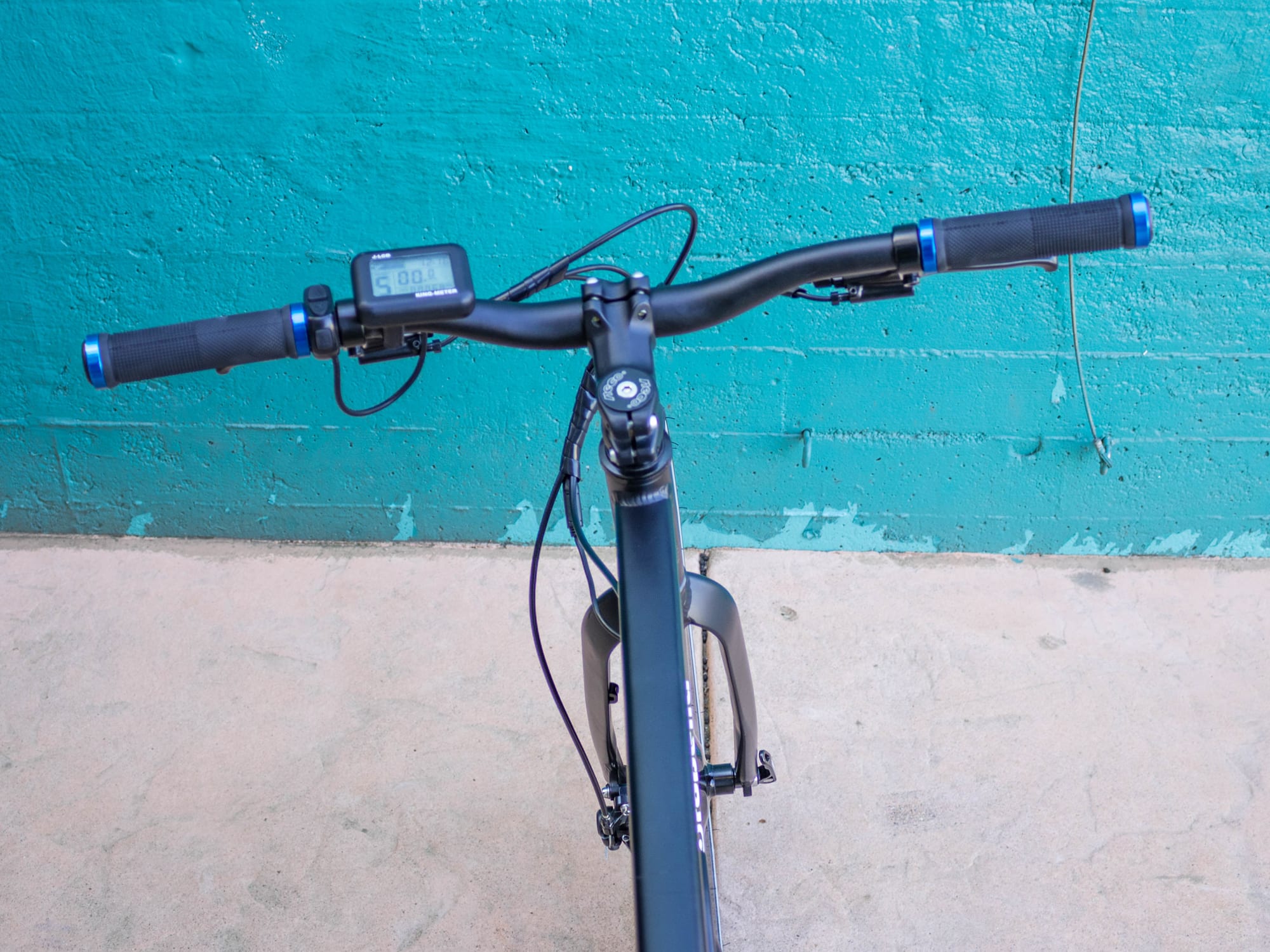
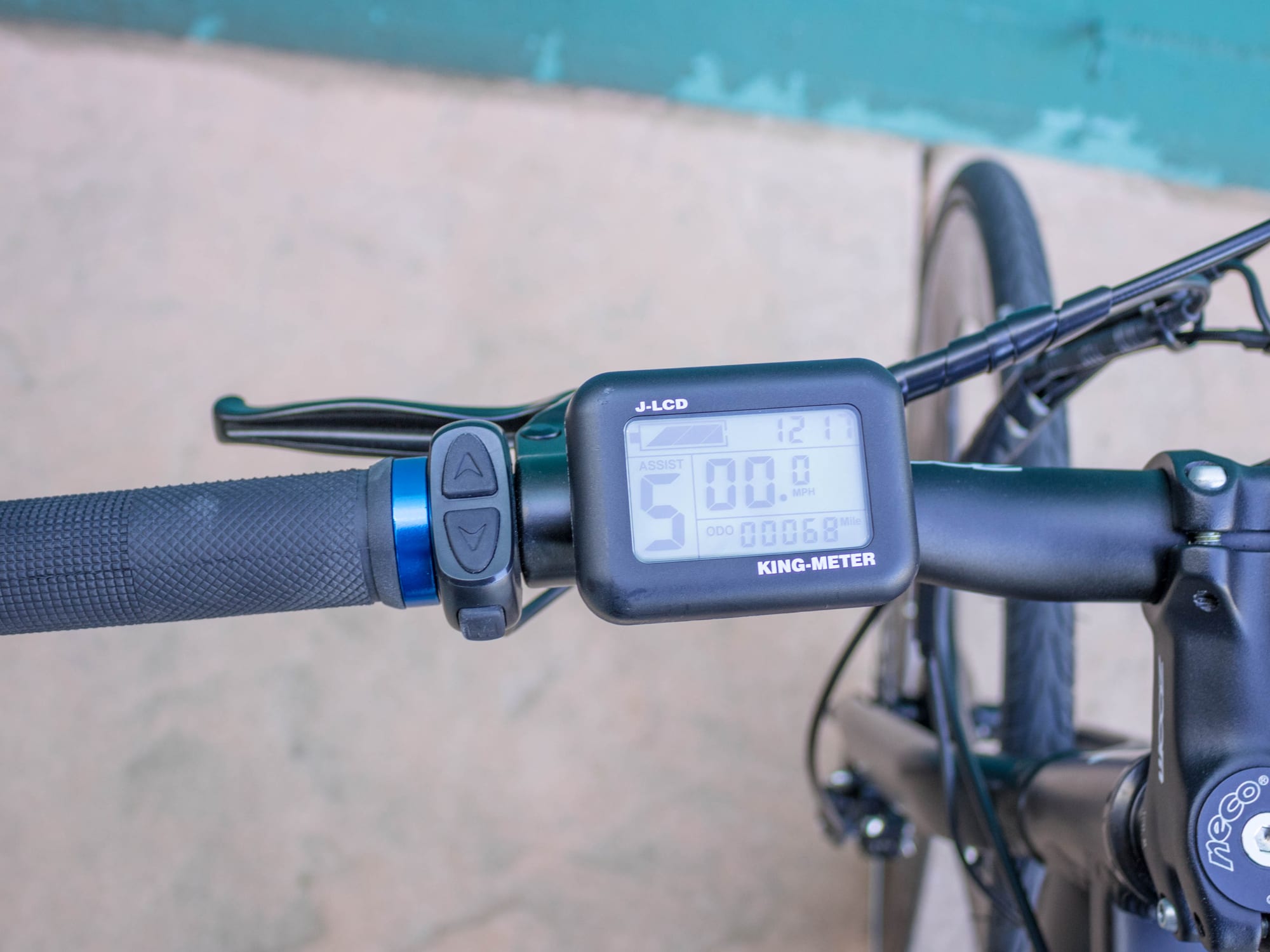
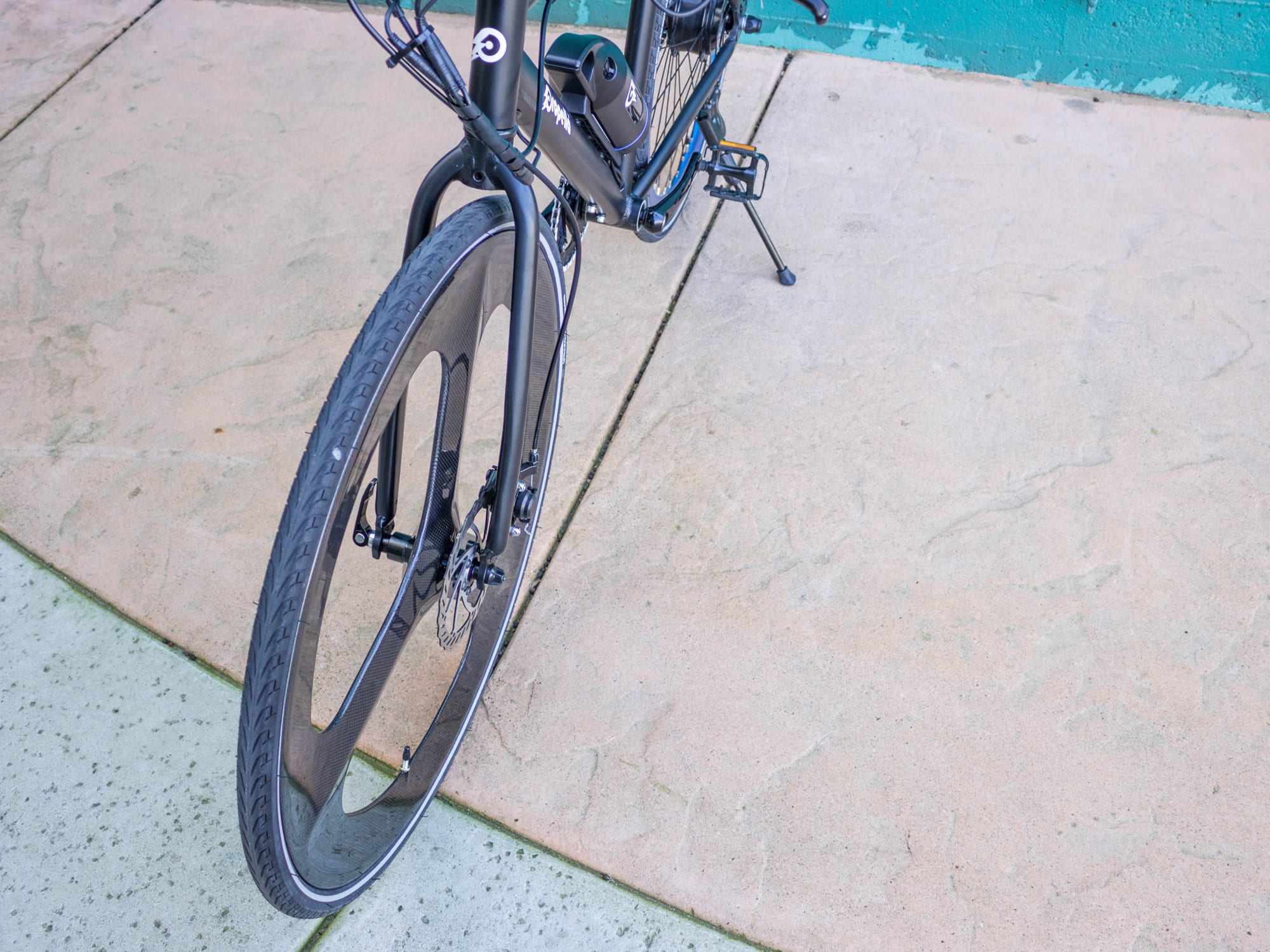
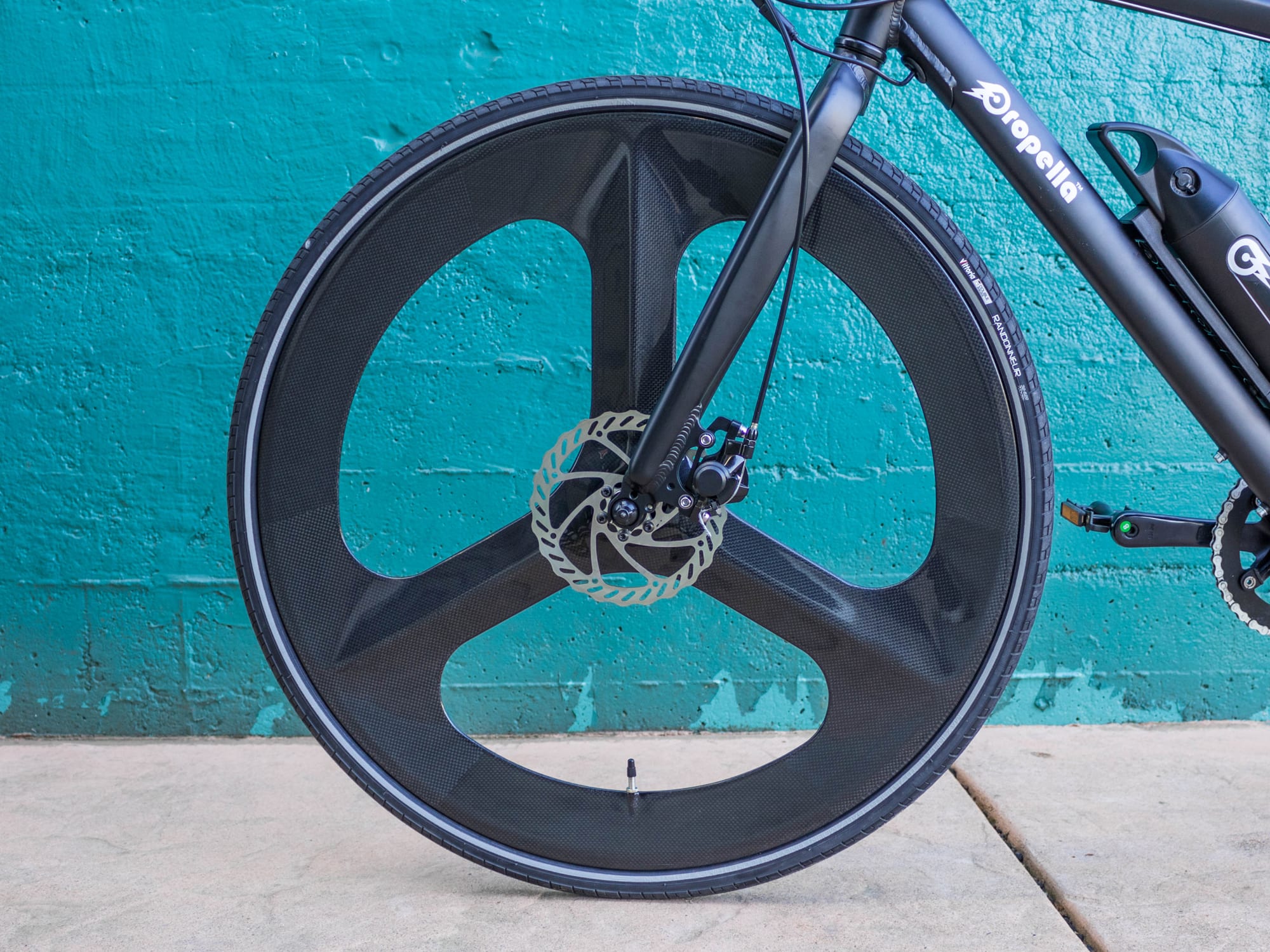
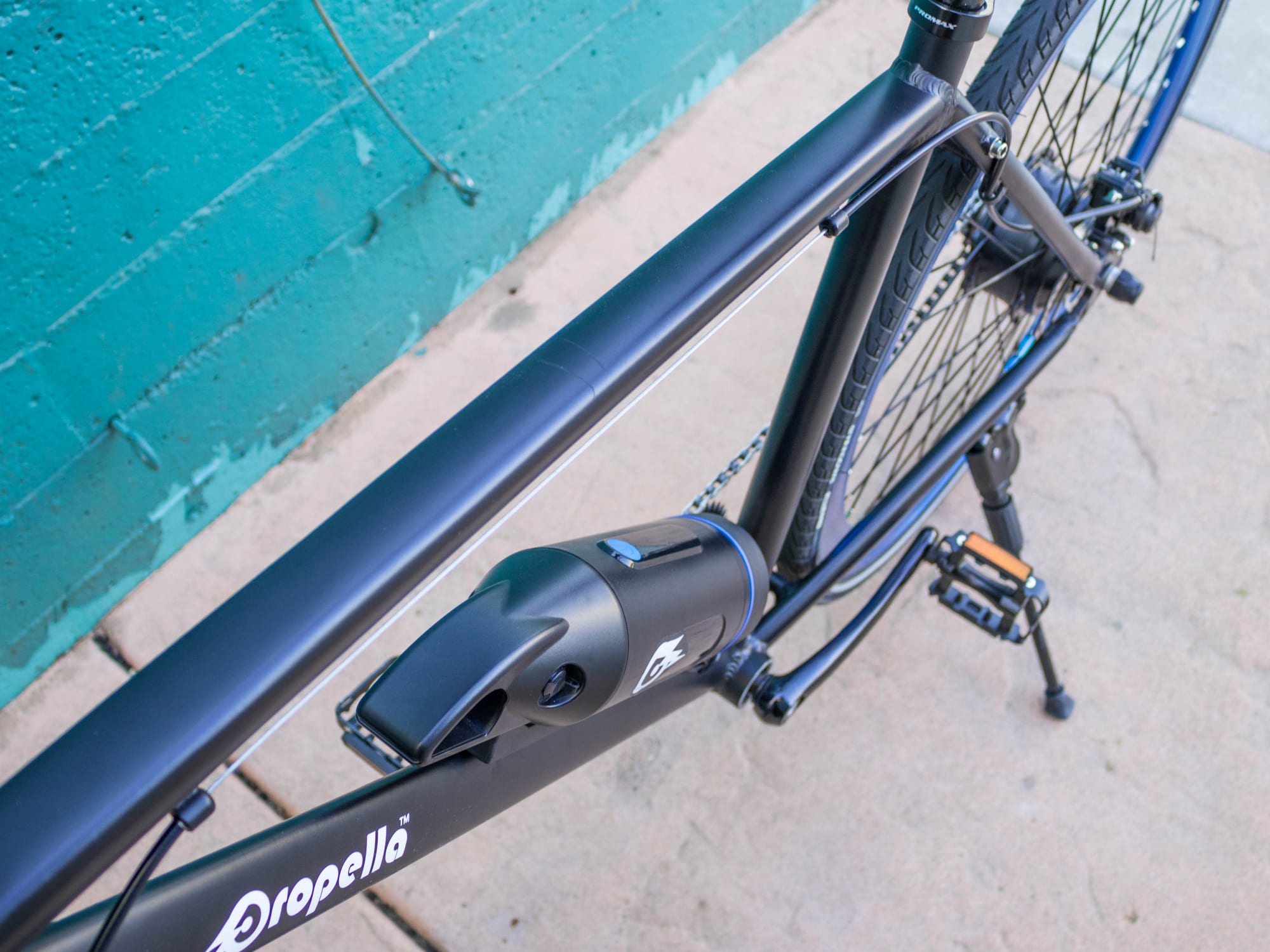

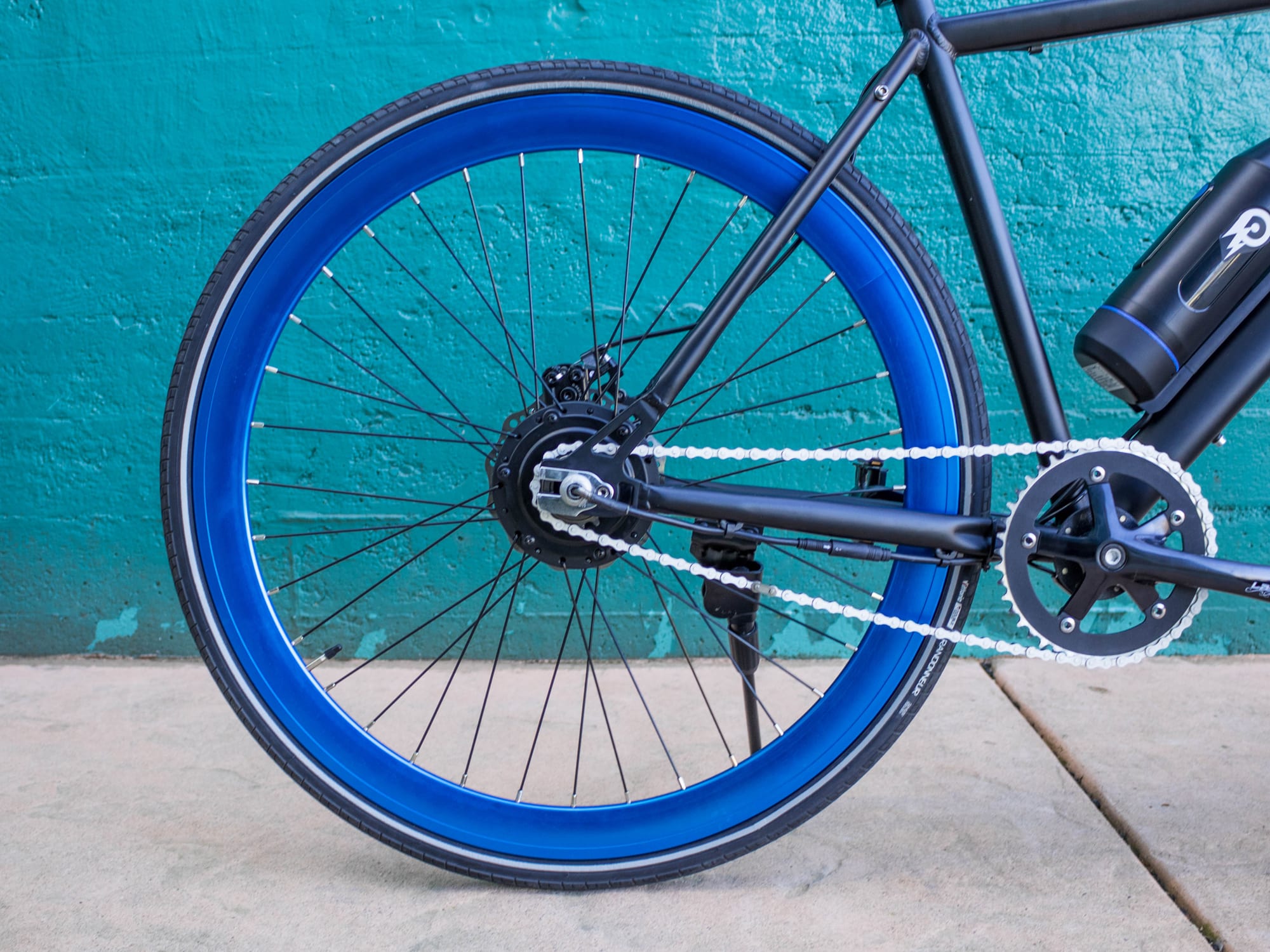
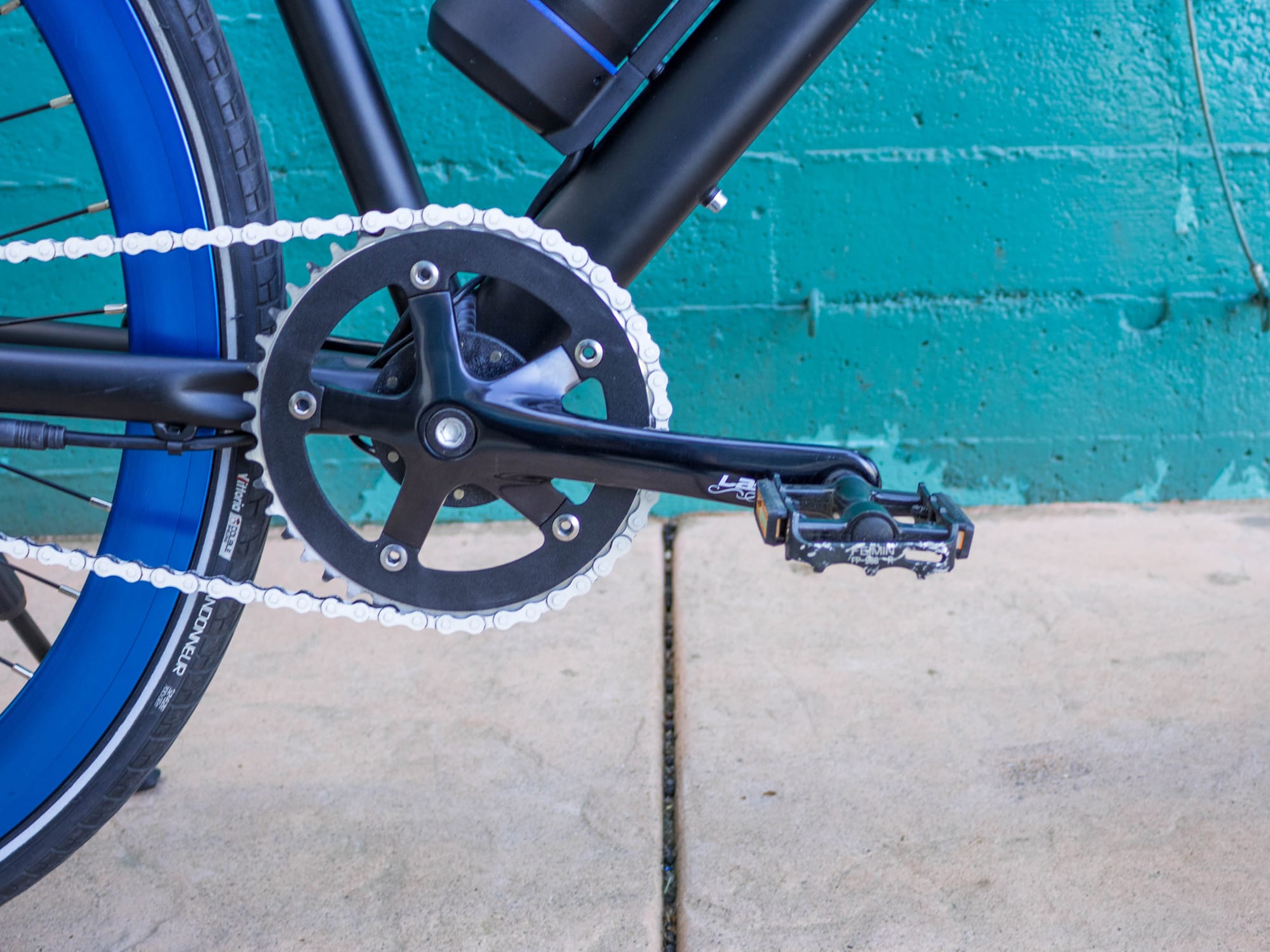

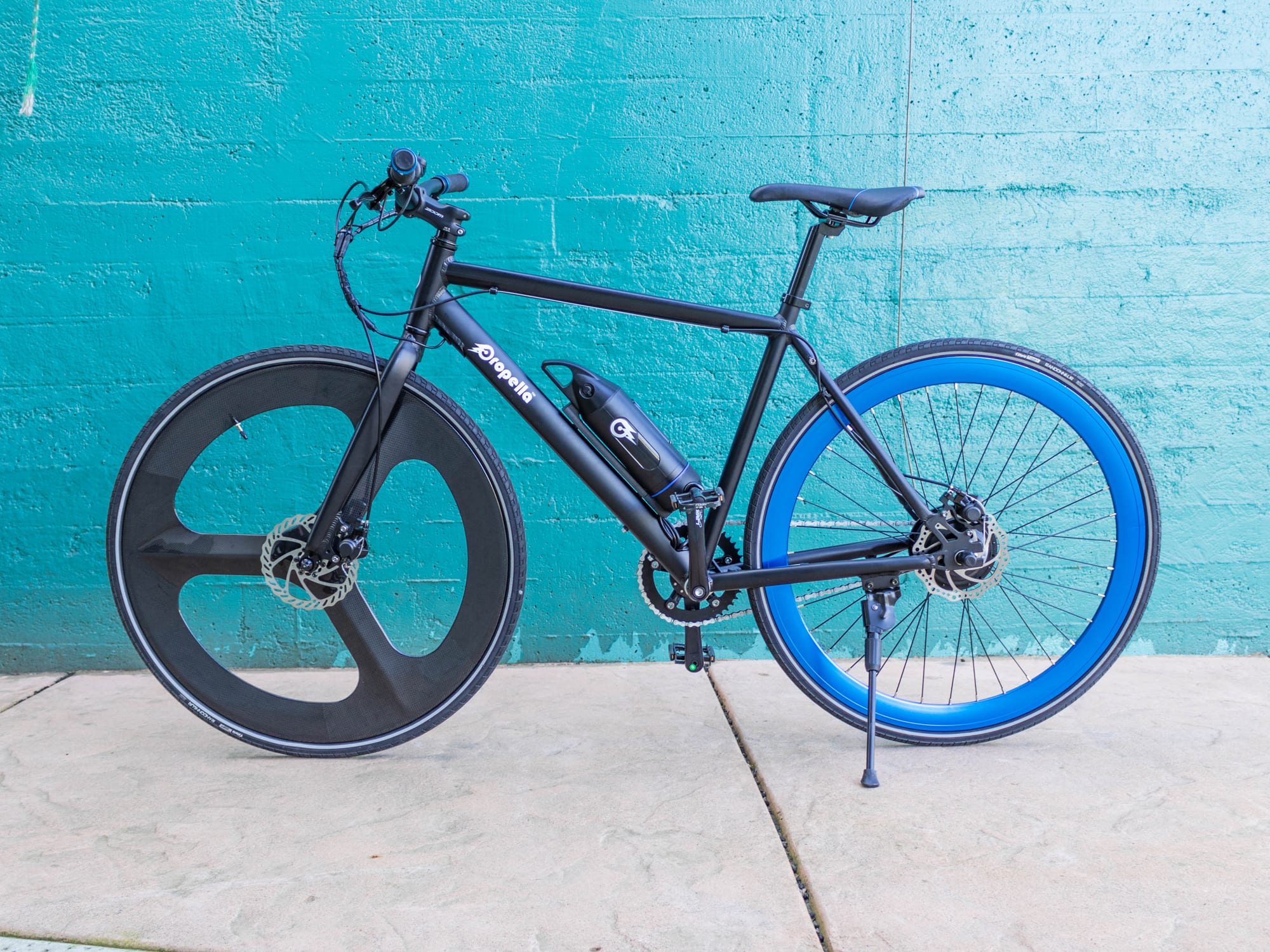
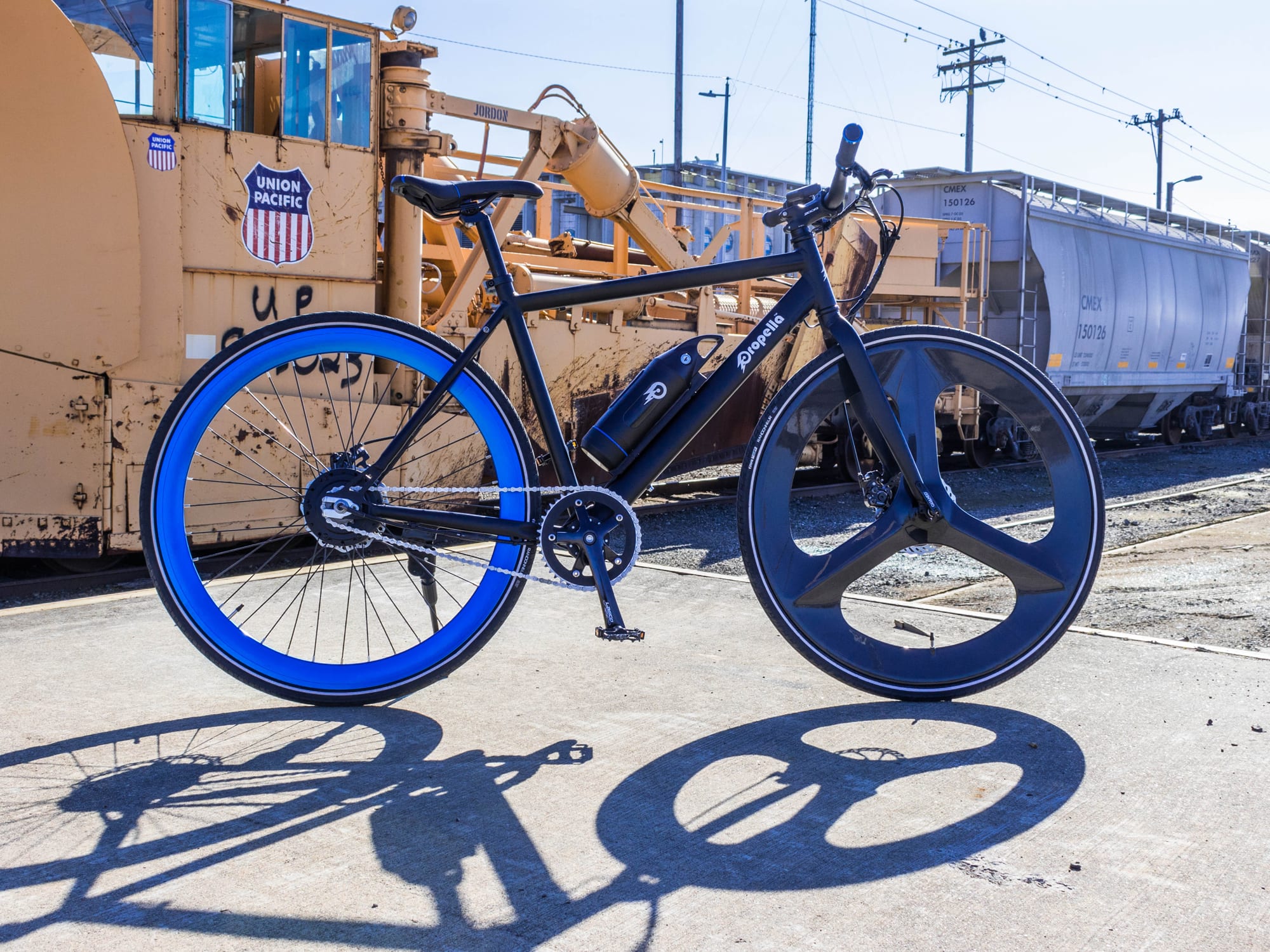



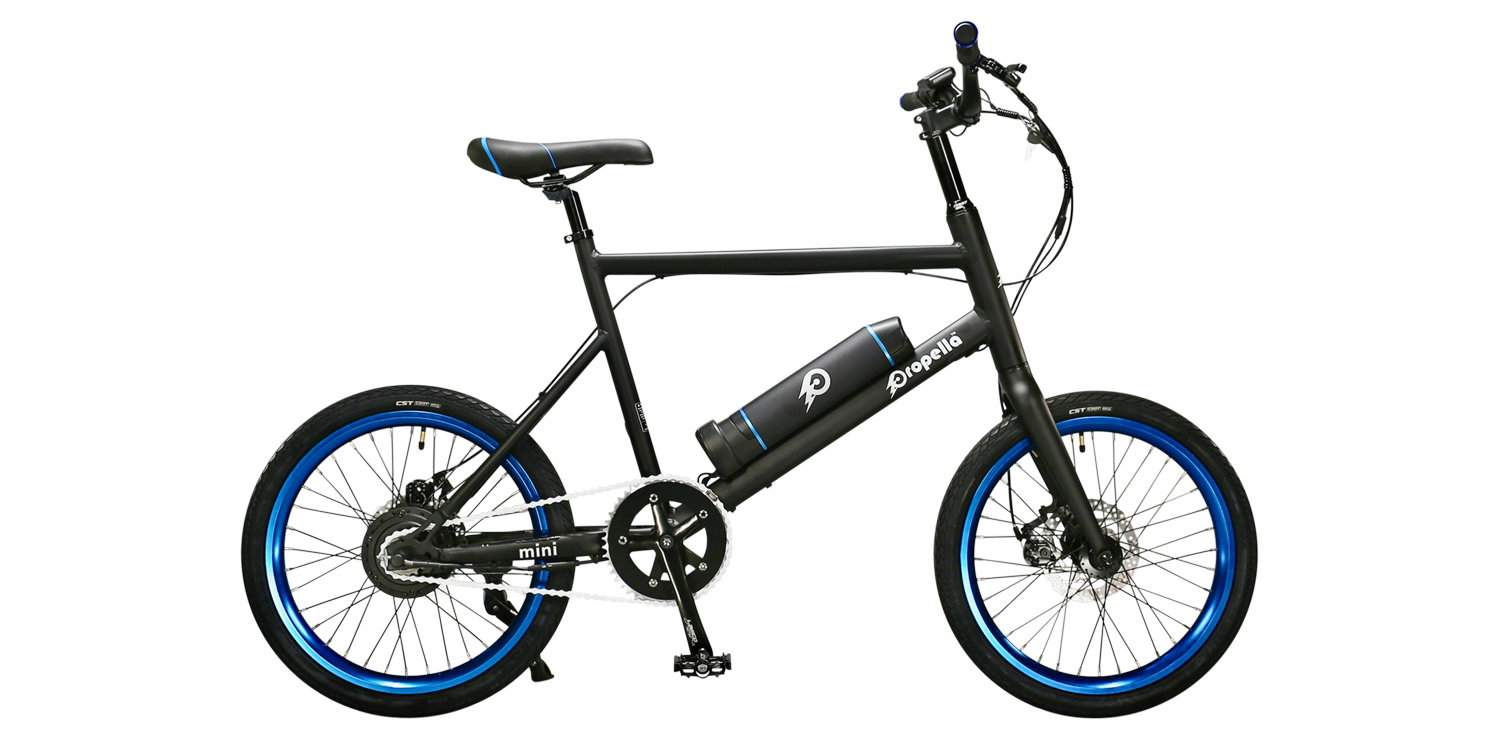
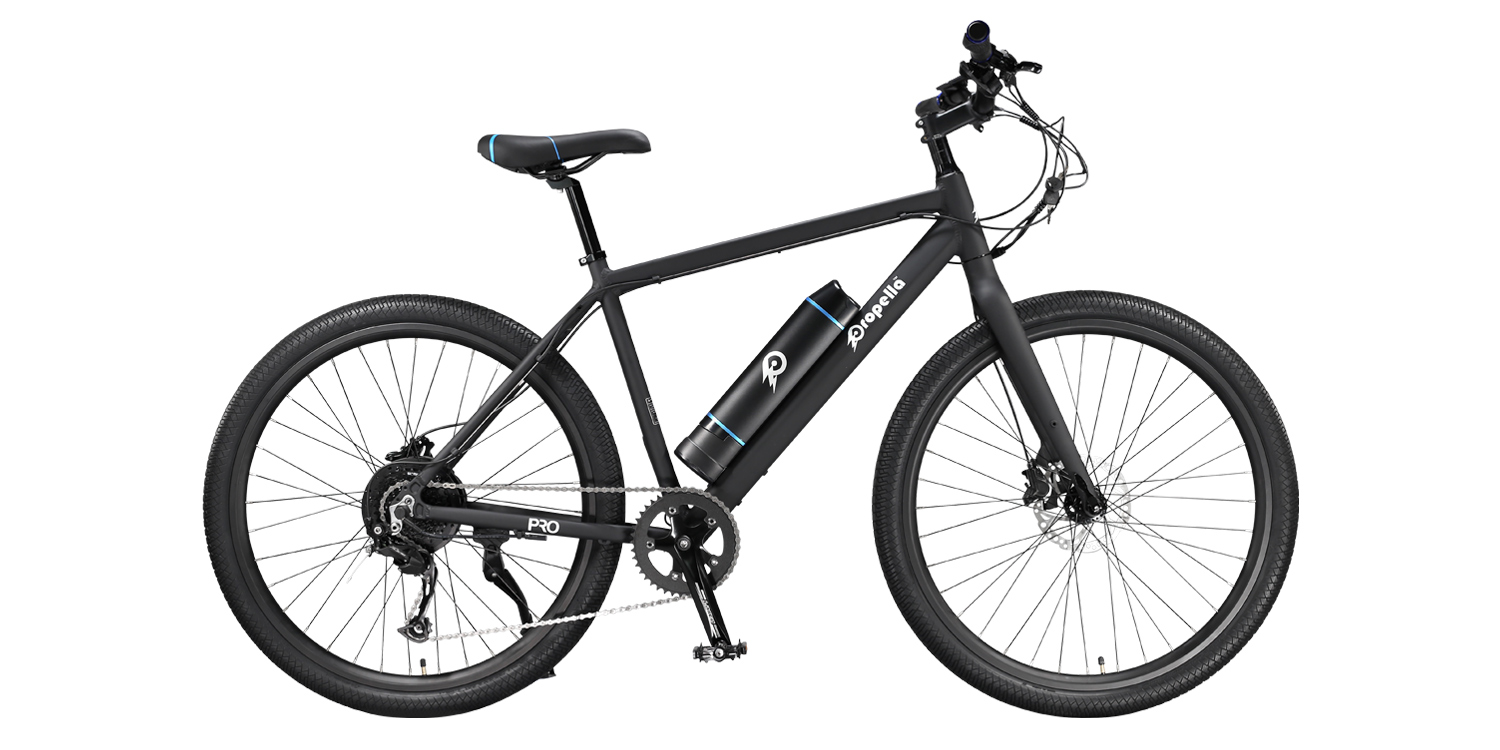
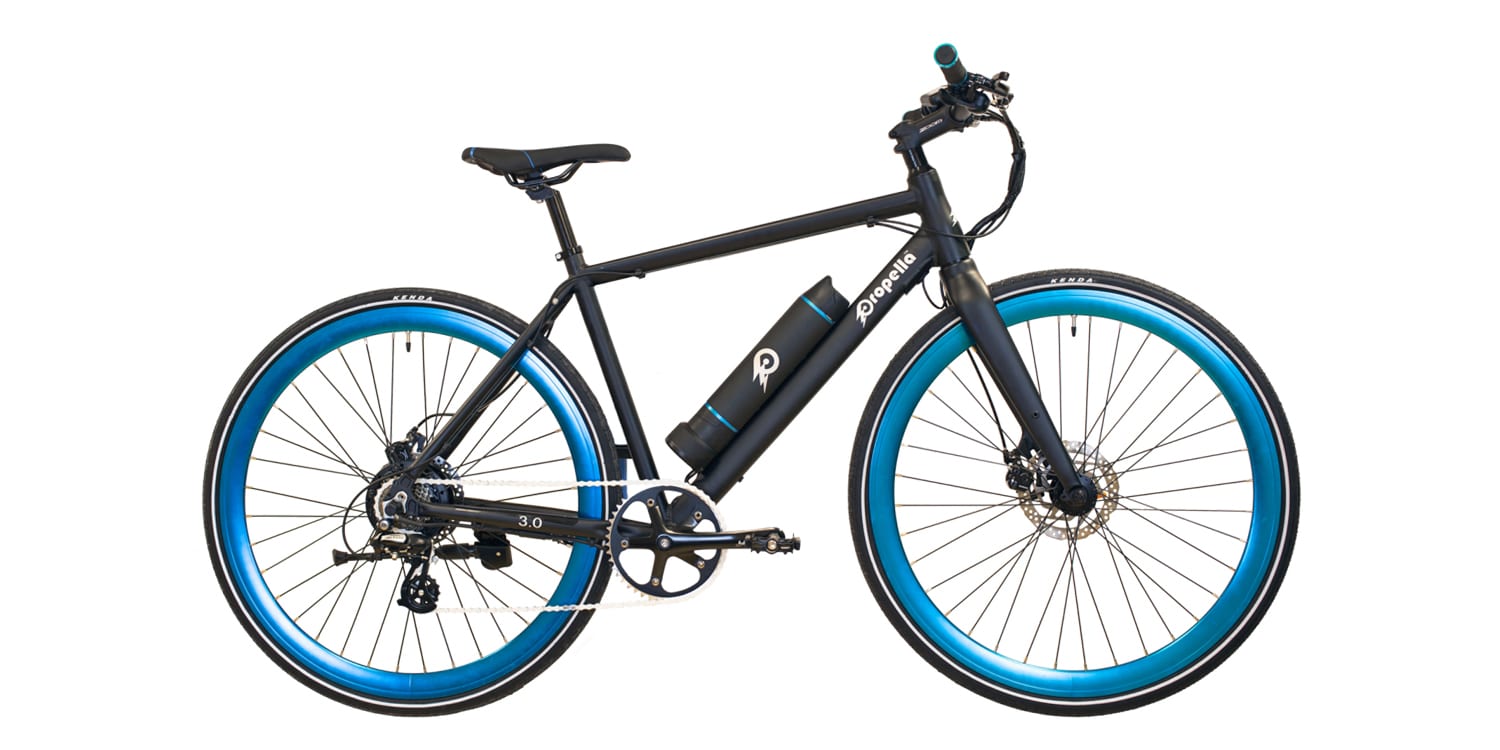
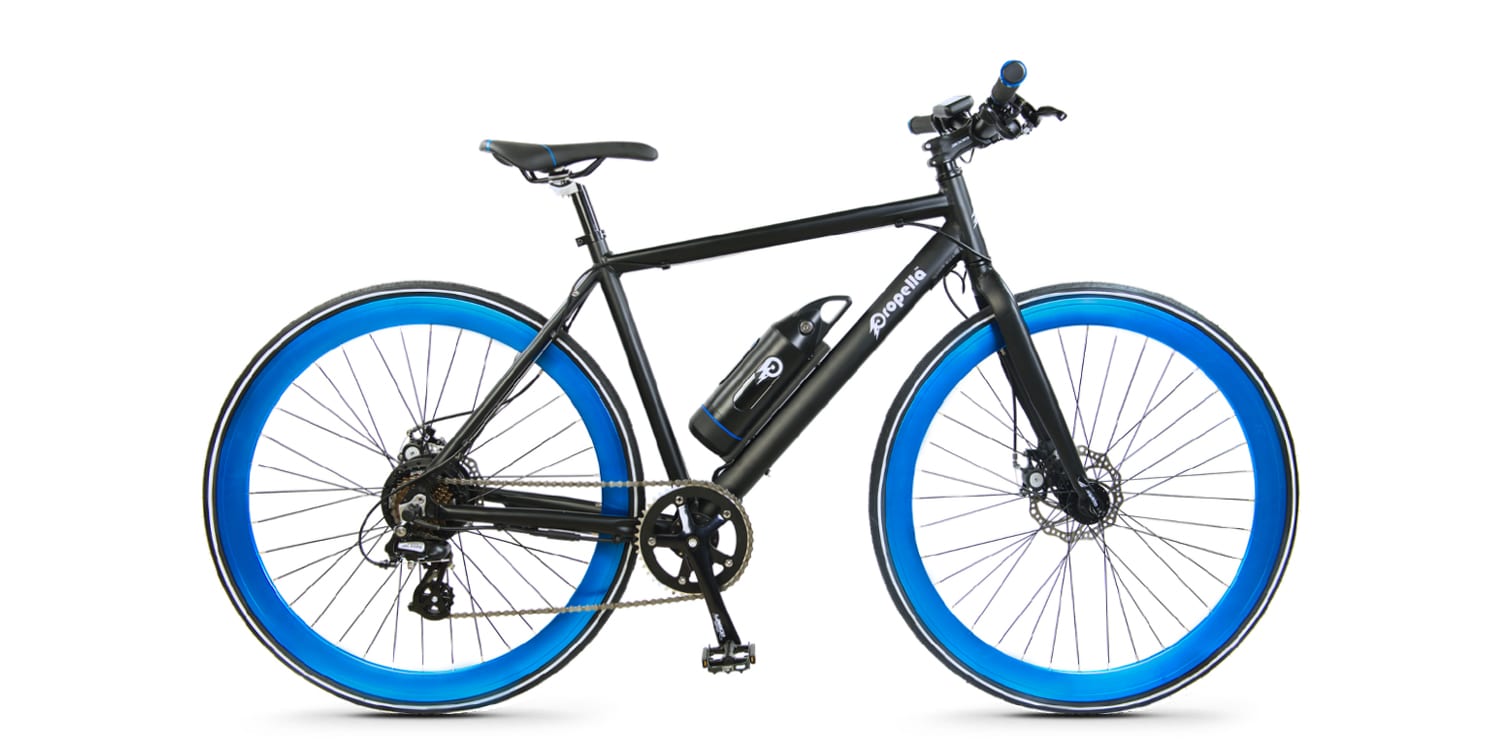
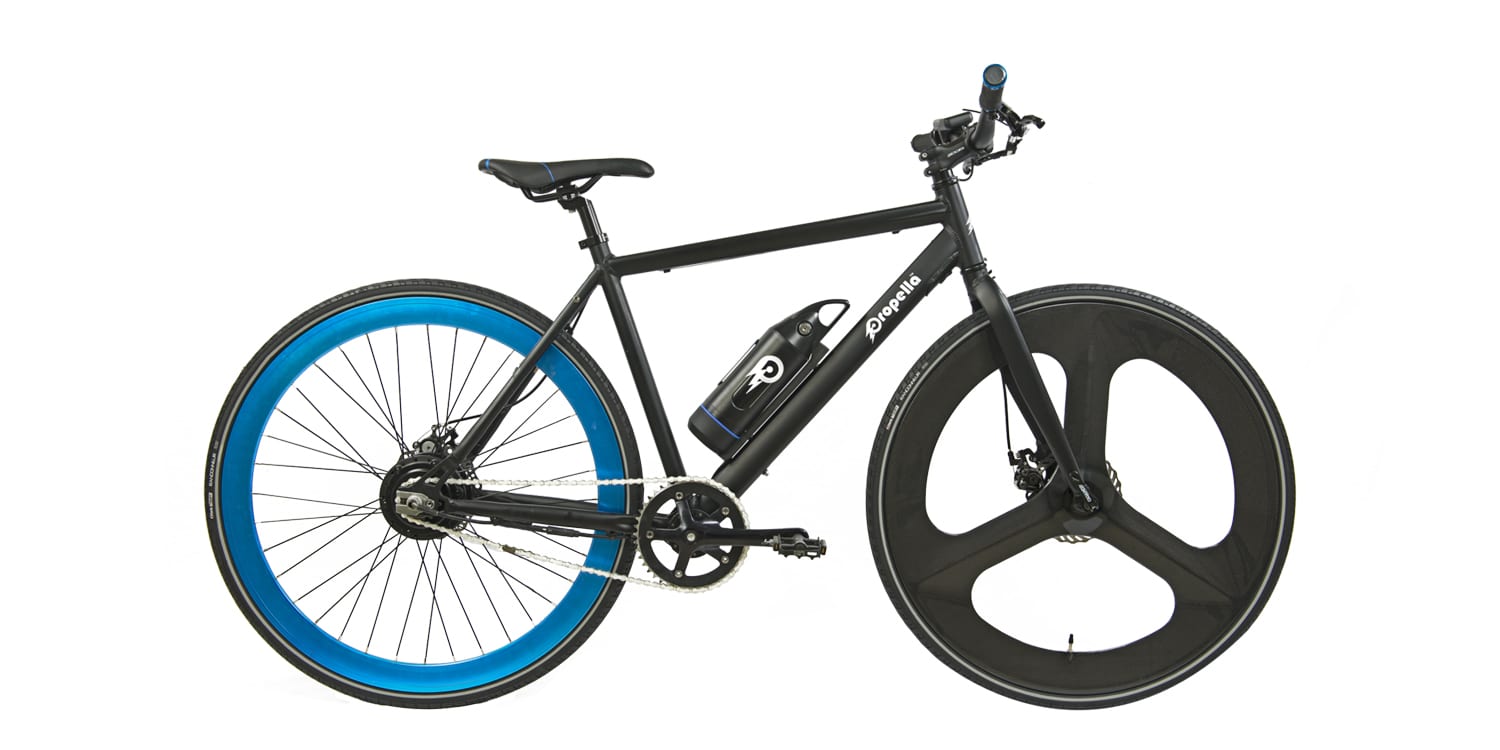

Mike Dills says
You are doing readers a disservice by writing articles about crummy cheap bikes that break down and even with a warranty, you are stuck. So just do companies that don’t pay you a fee to review their horrible bike. Please stick to major brands, since the entry level Haibike’s are now selling for $999 MSRP locally. Which will never give you a problem, goes 20, triple the range and will never break down.
Court Rye says
Hi Mike! I began working with Brent on reviews so that more products could be covered. Neither of us have owned this particular bike so we cannot say how well the warranty will be supported, but the parts are common and the bike is simple enough that it should be decent… Propella has been around now for a couple of years and seem to be refining their offering. In my opinion, this is a step up from many products on Amazon or eBay because you can reach the team directly. Indeed, there are great deals to be had right now (between seasonal highs) but the goal of this website is to cover the objective details of each new bike and provide a resource for people to get a third party perspective and then analyze photos and comments for themselves. It’s not “best ebike recommendations dot com” it’s simply a review site, and we’re doing our best to be fair and complete. Thanks for sharing your input and suggestions :)
Jason says
Hey Mike, I loved the review, it was exactly what I was looking for. And I believe that it is not a crummy cheap bike, I just got one and it is fantastic. So you are doing a disservice by posting your comments. If you don’t want to read the review then don’t read it. This was a nice, helpful review and from other comments on here it seems others agree. And stop bashing the quality of a bike you obviously know nothing about.
Court says
Hi Jason, I’m glad that you enjoyed the review and appreciate your constructive words about the Propella. I try to keep the comments here as open as possible because everyone has a different perspective. The goal is just to be polite and focus on the bikes… so anyway, glad the Propella is working well for you and I hope you have many more miles of fun rides :D
Urry says
Thank you, Brent, for such a comprehensive review! Details and recommendations are very appreciated.
bob armani says
Nice bike however, with no torque sensor, I would opt for the EM EasyGO Race which has a torque sensor and a more precise display interface for battery percentage, etc. It is also about the same weight class and could be found a lot less expensive if you find it on a sale or even as a demo bike. They need to do more refinements to this bike. However, I do like that this bike has mechanical disc brakes where as the other models in this class do not and it is also offered in a 7 speed. Some trade offs though. I would also like to see a battery upgrade and a smaller size frame as well for this bike in the future.
Court Rye says
Thanks for sharing your thoughts Bob! I’d love to see a smaller frame option as well, especially since it only comes in high-step for now :)
Mike says
A carbon fiber ‘aero’ wheel for a bike that only goes 16 mph? Hmnn. Interesting product marketing. What happens when you get hit with some powerful cross winds?
Court Rye says
I’m so glad you asked Mike… the bike will go EVEN FASTER!!!
Curt says
Thanks for the very solid review. I was an early backer of the 7-speed 2.0 version and have found it to be great fun. The motor engages very smoothly which gives it a very natural feeling ride. The feel of the ride and the maneuverability is very much like a conventional bike – it just feels like you’re riding with the wind at your back all the time – a great feeling. There are steep hills in my area and I have found the 7-speed option to be great for those. I’ve popped a front handlebar bag and a lightweight aluminum rear rack (neither of which detract from its simplicity) that make it very versatile for doing quick errands by bike rather than car. It is certainly a very stylish bike and gets lots of comments that way. I’m a bit over 6 feet tall and found that my positioning on the bike was much more comfortable with an adapter to raise the handlebars – that is the only modification I’ve made for “fit” purposes. I disagree greatly with the first comment writer, Mike, who suggested you are doing a disservice by reviewing bikes from small companies. I did lots of research on e-bikes before choosing the propella bike and, like you, believe they put a great deal of thought into the design and selection of components to produce a bike that for the money seemed much better than what I could find elsewhere – lightweight, fine components, impressive styling and functionality – you can’t ask for much more. I did buy a second battery and for long rides carry it in a triangle frame pack – if I use the middle power setting that gives me a range of 50 to 60 miles after swapping out batteries.
court says
Hi Curt! It’s near hearing about the different accessories you’ve found to fit your Propella, and I appreciate that some of these cheaper bikes are still very relevant and worth covering and posting here. I’d love to see your modifications and accessories if you ever feel like taking some pics and sharing in the Propella Forums. Have fun out there and thanks again :)
David says
Hi, thanks a lot for the review, made me pull the trigger last night while the free-shipping deal was still available. All I wanted was a simple light e-bike for commute. However, I now wonder about the following: since the battery seems to be ‘custom made’ for this, what happens in 2-4 years when the current one wears out. Maybe the company won’t exist anymore, or even if it does, if they change battery model moving forward, will they still offer replacement for this one? I guess this apply to any ebike with custom battery, but might be more problematic for smaller companies? Just wondering what people do with this issue… Thanks!
court says
Great question David! If Propella went out of business and you weren’t able to find a similar pack on eBay or elsewhere, you could probably have the existing one re-packed with brand new cells… and probably get a higher capacity! Lithium-ion cell technology has been improving, getting smaller and lighter for the same watt hours, and there’s a gentleman named Patrick Duggan that I met in Denver who focuses entirely on repacking. His company is called Hi-C Battery and you can reach out to him pretty easily for quotes and stuff :) I hope you enjoy the Propella and would love to hear updates as you test it out and learn the nuances. Did you get the fancy aero rim by any chance?